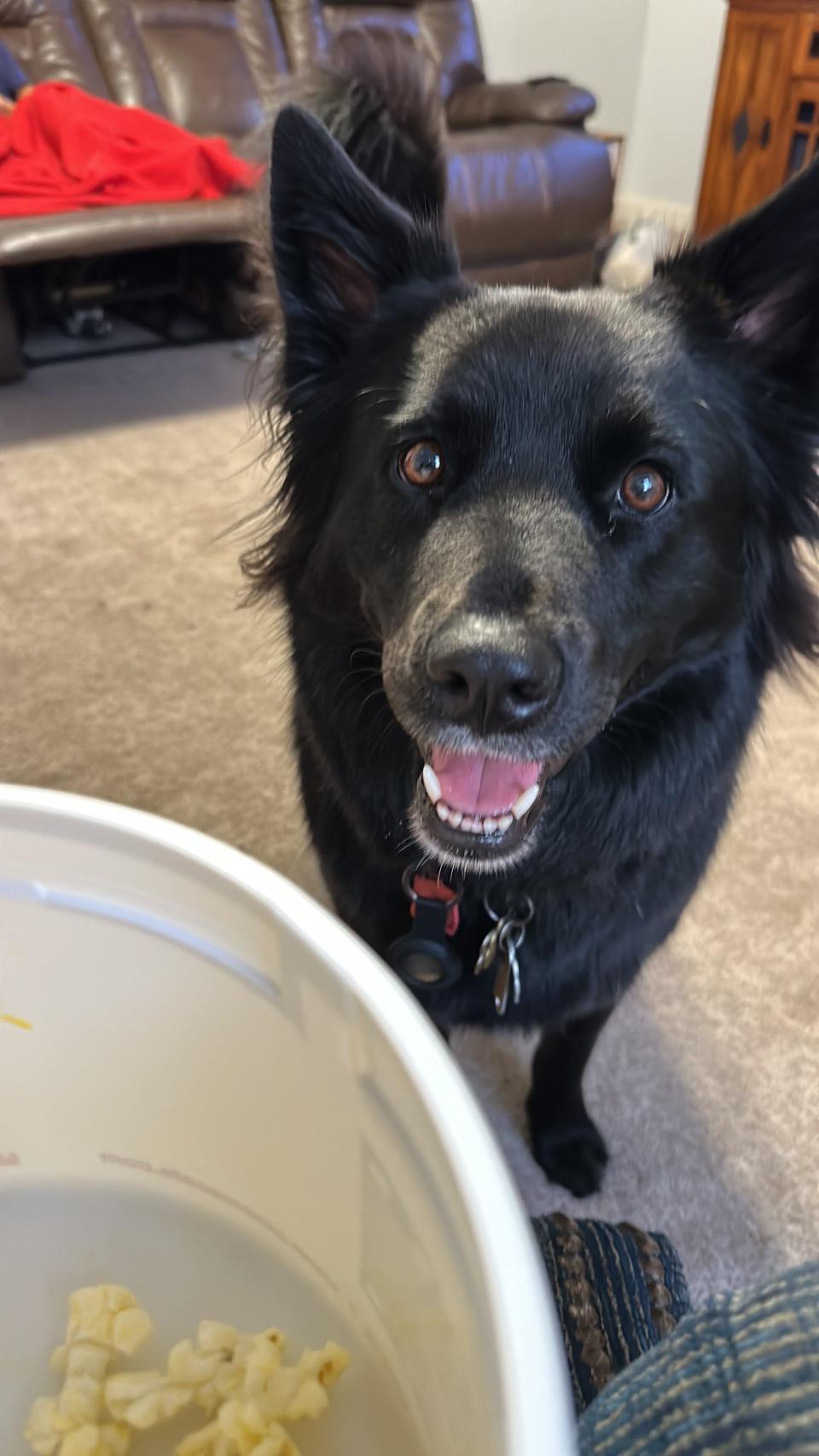First, you get the look with those deep, soulful eyes staring into your heart.
Then, the paw slowly lifts up as if she wants to shake your hand or say “Helllllooooo, I’m right here!”
At that point you immediately wonder, it’s only one little piece. Can this hurt my dog?
In many cases, dogs can eat the foods humans eat. However, certain items are best avoided. Here’s a little help in finding out what your dog can eat and, when in doubt, check with your veterinarian.
What human foods can dogs eat?

While your dog’s diet should mostly contain nutritionally complete dog food, there are some human foods your dog can eat, according to the American Kennel Club.
-
Beef: Lean cuts of beef are good for dogs. Make sure the meat is fully cooked and trimming the fat is recommended. Do not give your dog meat seasoned with rubs or spices which may contain onion or garlic, which is toxic to dogs. Dogs can also eat beef jerky, but it’s best to make sure it comes from one meat source.
-
Cashews: Unsalted cashews are good in moderation. Cashews have calcium, magnesium, antioxidants, and proteins, but too many can lead to weight gain.
-
Cheese: Every dog owner knows about the “Cheese Tax.” As long as your dog isn’t lactose intolerant, cheese is fine as a treat in moderation. Just be prepared, if you sprinkle it on your dog’s food to get her to eat, it’s a hard habit to break.
-
Chicken: Chicken, or chimkin as dog owners jokingly call it, is a healthy source of protein and is given to dogs with sensitive stomachs or food allergies.
-
Coconut: The fruit, milk and oil are all good for dogs. It can help with bad breath and skin conditions.
-
Corn: Corn is good and found in many dog products. Pet owners need to make sure the corn is off the cob. The cob itself can cause intestinal blockage.
-
Eggs: Cooked eggs are always good. Raw eggs are best avoided.
-
Fish: Fish, with its amino acids and good fats, is good for dogs. Salmon and sardines are very beneficial. Sardines have digestible bones which give dogs extra calcium. Tiny bones need to be removed and the fish needs to be cooked. Fresh tuna, with its omega-3 fatty acids, is also good, but only in small portions. Canned tuna should be avoided in excess because it has amounts of mercury and sodium. It would also be a good idea to give your dog some coconut after eating sardines, just saying.
-
Honey: Honey has vitamins A, B, C, D, E, and K, potassium, calcium, magnesium, copper, and antioxidants so it’s good for dogs.
How to take your dog to the beach: Your guide to dogs at Delaware beaches, including rules, restrictions and reminders
-
Pork: Like beef, dogs can eat pork, but it’s best to give them lean cuts. Items like ham and hot dogs, while not bad aren’t healthy either. With hot dogs, you’ll also need to look at the package to ensure the meat isn’t seasoned with onions or garlic.
-
Milk: As long as your dog isn’t lactose intolerant milk is fine for dogs.
-
Peanuts and peanut butter: Peanuts have good fats and protein so they are good for dogs, just be sure to give them in moderation. Peanut butter is a puppy favorite with heart-healthy fats, vitamins B and E and niacin. Fur parents should read the labels and avoid products with xylitol, which is toxic for dogs.
-
Popcorn: Popcorn is a good snack for dogs in moderation. You need to make sure it’s unsalted, unbuttered and air-popped.
-
Shrimp: Shrimp is a good now-and-then item for dogs as long as the shell and tails are removed and it’s fully cooked.
-
Turkey: Like chicken, turkey is good for dogs, but you need to trim the fat, remove the skin and watch for bones. Avoid the turkey if it is seasoned with garlic or onions.
-
Yogurt: Plain yogurt is good for dogs. Avoid yogurts with added sugar and skip any with artificial sweeteners.
-
Fruits: Dogs can eat the following fruits – apples (no core or seeds), bananas, blueberries, canteloupe, cranberries, mangos, oranges (no skin or seeds), peaches (remove the pit), pears (no seeds), pineapple (no skin), raspberries, strawberries, and watermelon.
-
Vegetables: Dogs can eat the following veggies –cucumbers, pumpkin, broccoli, Brussels sprouts, carrots, celery, green beans, peas and spinach.
Moderation is key with some human foods dogs can have
Just because a dog can eat something, doesn’t mean it should.
According to the AKC, you need to watch the portion sizes. Even safe foods with high-fat content or high sodium levels can lead to health problems when given too often or the qualities are too large.
What human foods can’t dogs eat?

According to the AKC and the Humane Society of America, here are some foods dogs should avoid.
-
Alcohol: Amazingly, this has to be said, but dogs should never drink alcohol. And, if you go to a microbrewery serving “Dog Beer,” know that it’s not like human beer. It’s composed of bone broth. safe vegetables, fruits, oats, barley, herbs and nuts.
-
Almonds: Almonds may not necessarily be toxic to dogs, but, according to the AKC, they can block the esophagus or even tear the windpipe if not chewed completely. Salted almonds are dangerous because they can increase water retention.
-
Chocolate: Chocolate contains toxic substances called methylxanthines, which are stimulants that stop a dog’s metabolic process. If your dog eats chocolate, call your veterinarian or Pet Poison Hotline.
-
Cinnamon: The spice isn’t toxic, but it does cause intestinal issues and its oils can harm a dog’s mouth.
-
Onions and garlic: The vegetables are part of the Allium family, according to the AKC, and those plants are toxic to dogs. Pet parents should also avoid leeks and chives.
-
Ice cream: While dogs can have milk and yogurt, ice cream– even in pup cup form – is best avoided. The high sugar content can cause problems with a dog’s digestive system.
-
Macadamia nuts: According to the American Kennel Club, Macadamia nuts are among the most poisonous foods for Dogs.
-
Fruits: The fruits should be avoided – avocados, cherries, grapes, tomatoes and raisins.
-
Vegetables: These veggies should be avoided – asparagus, rhubarb, mushrooms and onions.
What to do if your dog eats something it shouldn’t
If possible, the first call should be to your vet. If your vet is unavailable, call the Pet Poison Helpline at 800-252-7894 or the ASPCA’s 24-hour Animal Poison Control Center at 888-426-4435. Also, know where the pet hospital emergency rooms are in your area.
This article originally appeared on Delaware News Journal: What can my dog eat? Safe, dangerous human foods for dogs
EMEA Tribune is not involved in this news article, it is taken from our partners and or from the News Agencies. Copyright and Credit go to the News Agencies, email news@emeatribune.com Follow our WhatsApp verified Channel




